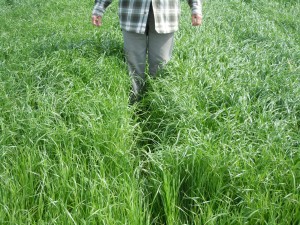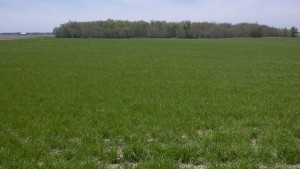
It’s May 7, 2011. I received five phone calls yesterday from farmers that have wet fields…flooded fields, and knee high annual ryegrass and winter rye. The question from all five can be summed up as “I wanted to kill my cover crop earlier but it was too cold, now it’s too wet; this stuff is growing like crazy…what should I do now?”
Again, I will tell you that I am NOT a chemical expert. However, I get to rub shoulders with guys that do lots of spraying that have had very, very good success killing ryegrass over the past few years. One of the gentlemen that I trust (because I’ve seen his very good work) is Chris Nuest, who works for CFS at Winamac. He has done the spraying at Four L Farms where we saw a total of four escapes on ARg last season (on 200+ acres). Chris told me today that he will use the following formula to kill his taller annual ryegrass on his farm. These rates are per acre…he uses Round-up(R) at a 2 QT rate and Basis(R) at the 0.5 oz. rate along with a non-ionic surfactant, AMS, and a pH reducer.
His other recommendation was to maybe look at Basis(R) + Balance(R) Pro with Round-up(R) at full rates (again with AMS, and pH reducer). Here is another helpful site from Purdue.
Like I said, Chris has an excellent track record of killing annual ryegrass. E-mail me at dave@plantcovercrops.com if you want to contact Chris.

To quote a friend of mine…”the rain is falling, but the sky is not!”
This is AWFUL. You have a wonderful site here and compendium for cover cropping, and then you go and ruin it by endorsing Monsanto’s products. Why cover crop at all if you are just going to poison yourself and the fields you grow in? Cover cropping is about using agriculture techniques to get closer to nature in the ways we grow food and other plant resources. It is also about being responsible to the soil and doing what we can to keep it healthy. Please look into the research that shows Monsanto and other chem products are doing nothing positive for us. Good luck!
Hey Bryan! I appreciate your passion and your view point. Many producers do use Monsanto products and I’m not meaning to endorse any specific product on here…yet for those that do use chemicals they should know what to use so they can have success in their personal operations. I work hard to reach all sectors of agriculture with the blog. I would appreciate hearing how you use cover crops in your operation! Let me know and I’ll be sure to let others know how you do it! That would be a super way to show other options. Thanks! Dave
I have read that if you cut the ryegrass pre-boot stage, it is the most devastating to the plant. First, do you have any knowledge regarding this? Also, do you think it a reasonable no-chem strategy to direct-cut harvest the ryegrass and then sweep it to cut off the roots the moment it dries enough before you plant?
Hi Matt,
Ryegrass cut at pre-boot stage is challenging to the plant, however, forage farmers have been doing that for years and the annual ryegrass grows back (especially after the first harvest) pretty aggressively (with good moisture and good fertility present). However, after you harvest the cover crop you sweep it (I assume that means disk it?) then yes, most likely you will get pretty good control. You will not get 100% control that way. You may need to till the soil multiple times as the roots on the annual ryegrass are very fibrous and deep. In some situations you might get adequate control with one pass, but I’d sure keep my eyes open for re-growing plants. You do NOT want to let the “escapes” produce seed…then you have real problems.
Thanks for the reply. Actually when I say sweep I mean wide sweeps (16-20″ beet sweeps) for a field cultivator or chisel run shallow. Then I might go over the field with a vertical tillage disk to break up any shallow compaction. If I could avoid the second step, I could no-till into the killed rye with soybeans and still get a reasonable mulch for the beans. Thoughts welcome.
Matt, If you do this keep your eyes WIDE open for escapes. You do not want to have a field of Annual Ryegrass with some soybeans it it! Will you plant in 30″ rows so you could cultivate if need be? Are you organic? If not then you still have chemical options if need be…
Good to know. I was thinking about going to narrow row crops, 22-24″. Narrow enough to help shade and decrease inter-plant competition and wide enough to run a cultivator through. I do not intend to use any chemical control. Continued feedback is always welcome. Thanks
Matt from my experience I would not count on tillage to control annual ryegrass. Kill early in spring with chemical
I have the same problem with this wet winter. If I can mow do you suggest mowing short? Also if I’m left with burn down Should the rye be mowed prior to application?
I’m concerned about rye allelopathy. Has anyone ever looked into this? I have heard that the rye planted for forage has allelopathic affects on native grasses, I wonder if this could be an issue with traditional crops?
Hi Matt, Tom Kaspar at ARS in Ames, Iowa has done some studies on alleopathy from Winter Cereal Rye in Iowa. I have had very good experience with planting corn into Winter Cereal Rye on our farm in central Indiana two different seasons. I have posts on the blog about those experiences. Also we have several farmers having very good success planting soybeans into Winter Cereal Rye as reported here on the blog. You commented on the annual ryegrass page so I’ll address that too. I have yet to hear of any issues with annual ryegrass and alleopathy on any traditional crops. But, as you can see from the post…be sure to kill it dead in the spring!